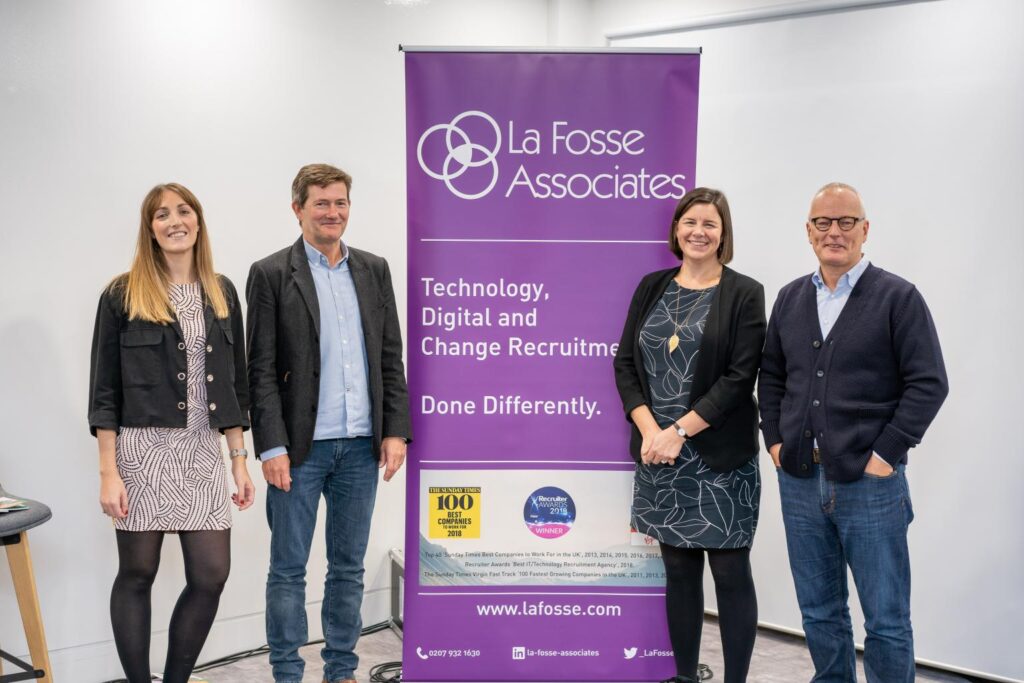Organisations are fast realising the value of a positive company culture: a Glassdoor survey revealed that 57% of UK employees value culture more than salary when it comes to job satisfaction, while a third of British employees choose to leave their jobs due to poor workplace culture.
To discuss this very topic, an expert panel facilitated by Ellen Donnelly, Head of Talent at Orkestro, met to share their experiences.
Jason Stockwood, Vice Chairman at Simply Business, Liz Robinson, Co-Director of Big Education, and Simon La Fosse, Founder and Executive Chairman of La Fosse, offered advice on building and maintaining an effective culture.
What is culture?
Culture is a difficult thing to measure – and therefore manage. As Jason explained, “Culture is what happens when management isn’t looking”. Because culture is led by individuals, senior management must explore the nuances of human interaction and go beneath the surface of employee behaviour.
Liz likened culture to the unspoken rules that many of us tend to adopt when getting into a lift with somebody else. Usually, eye contact is avoided, unless the other occupant is known. This behaviour is never agreed upon, and yet somehow it’s something we all inherently know.
Purpose plays a significant role in culture as well, especially amongst younger talent. Simon shared the experiences of his children who are job hunting, stating: “Neither can see themselves working for a company that doesn’t do good, that doesn’t have a purpose”. As the most socially-active generation there has ever been, Gen Z recruits entering the workplace are largely optimistic about their own future and, as such, want their work to have meaning and believe it should; a 2017 study of over 2,000 Gen Z respondents revealed a generation that is prioritising purpose in their work.
Culture built through experiments
Once you understand the people in your company, you can experiment with activities that help them to thrive in your workplace so that nobody suffers from the ‘Sunday-evening feeling’. At Simply Business, Jason believes in experimenting and learning from failure. The company is currently trialling a four-day week to see how it boosts employee morale and productivity at a time when YouGov research has shown that 63% of British people are in favour of a shorter working week, making Brits the most enthusiastic of seven European nations surveyed.
Values and trust
For leaders looking to build a strong and healthy culture, Liz recommended two focus areas: values and trust. If you start with trust and work backwards, you’ll attract the right kind of people to the team. Likewise, if everyone understands your company values and how their behaviour links to them, a culture of excellence, accountability and kindness can be born from it.
This rings especially true for start-ups and scale-ups. During a period of high growth, some company values can be lost. Constantly communicating those values will help your team to live them every day. It doesn’t have to involve a formal process – even sharing your values through giveaways can help.
Encouraging vulnerability
Providing psychological safety, where people feel they can try things and don’t fear failure, is key to building a strong culture. Opening up about issues and sharing human experiences can create a more inclusive culture where people can be themselves. One suggestion was to have a ‘trip report’ at every Monday meeting to enable everyone to share what they did at the weekend.
How to measure your culture
Traditionally, retention has been the main measure of the health of a company’s culture. However, as Simon explained, this is a lag indicator and can only tell you where your culture has failed an individual after the failure.
Now, employer review sites and software can give an earlier indication of your culture. Simon emphasised the need for a continuous indicator and for a company to correct any issues that are identified early on before the damage is done.
A new approach
Ultimately, it’s the leaders who go the extra mile with their culture who will eventually win the race. Building a great culture doesn’t happen overnight; it requires a fresh approach, one of experimentation, sharing, and continuous refinement.

Want to find out more about building a world-class culture through world-class recruitment? Get in touch with claudia.cohen@lafosse.com, or call on 020 7932 1652.
Where to next? Find out more about our executive capabilities.
